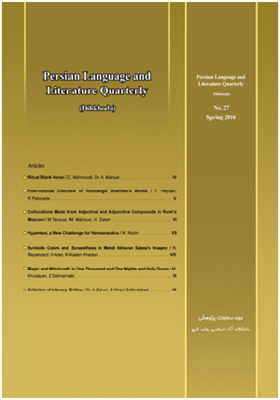Collocations Made from Adjectival and Adjunctive Compounds in Rumi’s Masnavi
Subject Areas : Persian language and literature textsMahmoud Tavousi 1 , Mehdi Mahouzi 2 , Hamed Zakeri 3
1 - استاد گروه زبان و ادبیات فارسی، دانشگاه آزاد اسلامی واحد رودهن، رودهن،ایران.
2 - دانشیار گروه زبان و ادبیات فارسی، دانشگاه آزاد اسلامی واحد رودهن، رودهن،ایران.
3 - دانشآموختةدکتری زبان و ادبیات فارسی، دانشگاه آزاد اسلامی واحد رودهن، رودهن،ایران.
Keywords: collocations, مثنوی, زبان, مولانا, language, Masnavi, Rumi, باهمآیی, ترکیب اضافی, ترکیب وصفی, adjectival compounds, adjunctive compounds,
Abstract :
Deviation from the linguistics norms is a characteristic of Rumi’s style. Sometimes his deviations give a very artistic aspect to his verse. The present research is to investigate adjectival and adjunctive compounds in Rumi’s Masnavi; the ones which he decided to change their structure and meaning. These changes, no doubt, have been done in an attempt to give an artistic aspect to the language, separating it from the standard language. His coinages could be labeled as collocations, but their significance is that rather than being just grammatical compounds, they bear new meanings which are deviated from the common sense. Among the findings of this study one interesting is the abstract collocations Rumi has used. These compounds, which are the outcome of a creative and liberated mind like Rumi’s, are unprecedented and cannot be found in previous poets’ verse; moreover, they are encouraging for readers to relate the words of a compound and find how they make sense
26. یوسفی، حسنعلی، ترکیبسازی در مخزنالاسرار نظامی، رشد آموزش ادب فارسی.
منابع لاتین
_||_

